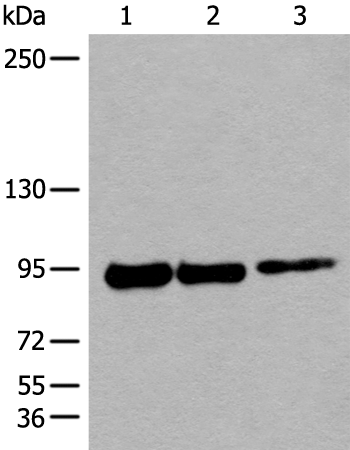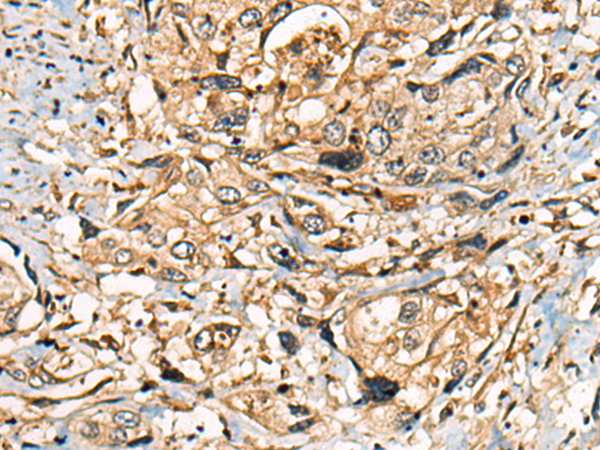

| WB | 咨询技术 | Human,Mouse,Rat |
| IF | 咨询技术 | Human,Mouse,Rat |
| IHC | 1/10-1/50 | Human,Mouse,Rat |
| ICC | 技术咨询 | Human,Mouse,Rat |
| FCM | 咨询技术 | Human,Mouse,Rat |
| Elisa | 1/5000-1/10000 | Human,Mouse,Rat |
| Aliases | PIBF; CEP90; C13orf24 |
| WB Predicted band size | 90 kDa |
| Host/Isotype | Rabbit IgG |
| Antibody Type | Primary antibody |
| Storage | Store at 4°C short term. Aliquot and store at -20°C long term. Avoid freeze/thaw cycles. |
| Species Reactivity | Human |
| Immunogen | Synthetic peptide of human PIBF1 |
| Formulation | Purified antibody in PBS with 0.05% sodium azide and 50% glycerol. |
+ +
以下是关于PIBF1抗体的3篇代表性文献的简要总结(基于公开研究整理):
---
1. **文献名称**:*Progesterone-induced blocking factor (PIBF1) modulates cytokine expression in peripheral blood mononuclear cells*
**作者**:Szekeres-Bartho J, et al.
**摘要**:该研究利用PIBF1抗体检测其在妊娠期外周血单核细胞中的表达,发现PIBF1通过调节Th1/Th2细胞因子平衡维持母胎免疫耐受,并抑制促炎因子如IL-12和IFN-γ的分泌。
---
2. **文献名称**:*The role of PIBF1 in recurrent pregnancy loss: A potential biomarker*
**作者**:Check JH, et al.
**摘要**:通过免疫组化结合PIBF1抗体分析发现,复发性流产患者的子宫内膜中PIBF1表达显著降低,提示其可作为妊娠失败的预测标志物,并可能通过孕酮治疗恢复其水平。
---
3. **文献名称**:*PIBF1 expression in tumor-associated immune cells promotes cancer immune evasion*
**作者**:Miko E, et al.
**摘要**:研究利用PIBF1抗体在卵巢癌组织中发现,肿瘤微环境中高表达的PIBF1通过抑制NK细胞活性和T细胞增殖,促进肿瘤免疫逃逸,为靶向治疗提供依据。
---
如需具体文献来源,建议通过PubMed或Google Scholar搜索上述作者及关键词获取全文。
The progesterone-induced blocking factor 1 (PIBF1) antibody is a tool used to detect and study the PIBF1 protein, a molecule implicated in immune modulation and reproductive biology. PIBF1 is primarily expressed in response to progesterone signaling and plays a critical role in maintaining maternal-fetal immune tolerance during pregnancy by suppressing natural killer (NK) cell activity, shifting cytokine profiles toward a Th2 bias, and inhibiting T-cell proliferation. It is also associated with cancer progression, as PIBF1 overexpression in certain tumors may promote immune evasion and metastasis. Structurally, PIBF1 exists in multiple isoforms, including nuclear and cytoplasmic forms, with roles in cell cycle regulation and signal transduction.
Antibodies targeting PIBF1 are widely utilized in research applications such as Western blotting, immunohistochemistry, and flow cytometry to quantify protein expression, localize it within tissues or cells, and explore its functional mechanisms. These studies have linked PIBF1 to pathologies like preeclampsia, preterm birth, and cancers (e.g., glioblastoma, ovarian cancer), highlighting its dual role in immune suppression and disease pathogenesis. Commercial PIBF1 antibodies are typically raised in rabbits or mice, with validation focusing on specificity, sensitivity, and cross-reactivity. Ongoing research aims to leverage PIBF1-targeting strategies for therapeutic interventions, including cancer immunotherapy or managing pregnancy complications.
×